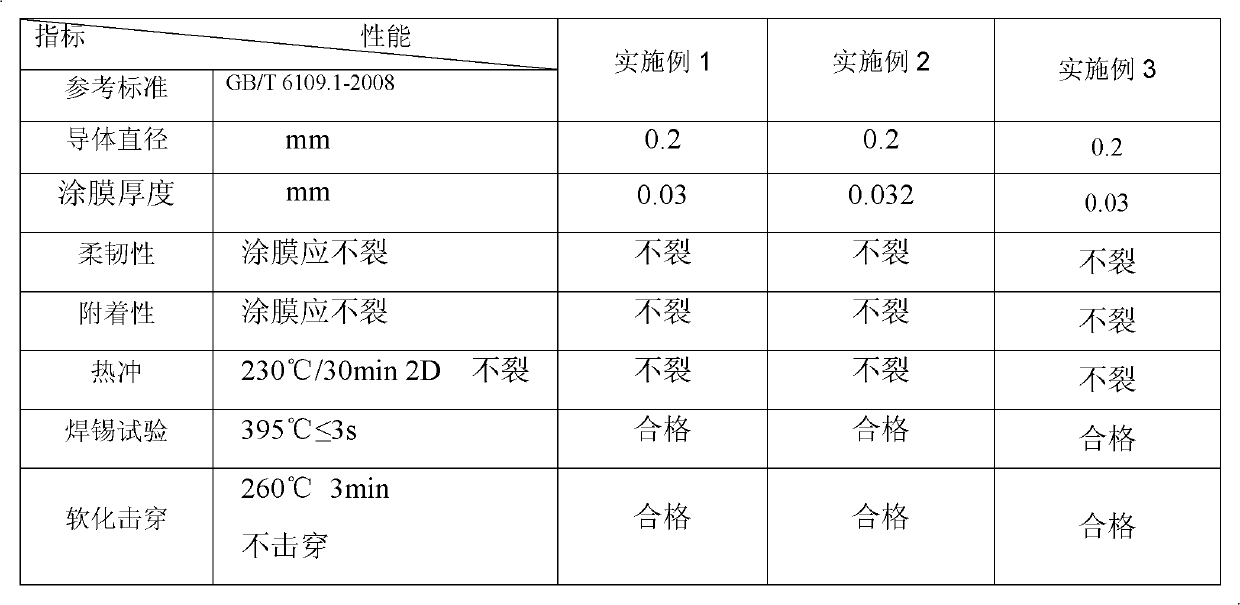Method for synthesizing C-level polyurethane wire enamel
A technology of polyurethane paint and synthesis method, applied in the direction of polyurea/polyurethane coatings, coatings, etc., can solve problems such as the influence of physical properties of products, restrict the development of electrical insulation industry, poor heat resistance, etc., and achieve good solderability and physical properties. The effect of easy control of the reaction process and high heat resistance
- Summary
- Abstract
- Description
- Claims
- Application Information
AI Technical Summary
Problems solved by technology
Method used
Image
Examples
Embodiment 1
[0019] In a three-necked flask equipped with a stirrer, a thermometer and a condenser, add a metered amount of tris-(2-hydroxyethyl) isocyanurate (1.0mol), N-methyldiethanolamine (6.5mol), 3,3 ',4,4'-Biphenyltetracarboxylic dianhydride (0.8mol) and zinc acetate as a catalyst, heat to 100-120℃, then add dimethyl terephthalate (5.2mol), stir to dissolve, heat up to 150 React at ℃ for 4h, program the temperature to 220℃ for reaction. When the temperature of the distillation head is lower than 60℃, perform vacuum operation. The pressure will be small and then large, first slow and fast until the viscosity is between 950-1300mPas (25℃), stop the vacuum Operate, take a sample to measure the acid value of 2.49 and the hydroxyl value of 147.1, add a metered amount of cresol to dissolve it until it is clear.
[0020] Add a certain amount of diphenylmethane diisocyanate into a three-necked reaction flask equipped with reflux condenser, thermometer and stirrer, add the same amount of DMF an...
Embodiment 2
[0023] In a three-necked flask equipped with a stirrer, a thermometer and a condenser, add a metered amount of tris-(2-hydroxyethyl) isocyanurate (1.0mol), N-methyldiethanolamine (6.5mol), 3,3 ′,4,4′-benzophenonetetracarboxylic dianhydride (0.8mol) and zinc acetate as a catalyst, heat to 100-120℃, then add dimethyl terephthalate (5.2mol), stir to dissolve, heat up to 150 React at ℃ for 4h, program the temperature to 220℃ for reaction. When the temperature of the distillation head is lower than 60℃, perform vacuum operation. The pressure will be small and then large, first slow and fast until the viscosity is between 950-1300mPas (25℃), stop the vacuum Operate, take a sample to measure the acid value of 2.71 and the hydroxyl value of 198.2, add a metered amount of cresol to dissolve it until it is clear.
[0024] Mix 160.1g of the above polyester polyol, 700.2g of MDI trimer in Example 1, 850.1g of cresol, 430.2g of xylene, 201.1g of DMF, 35.1g of zinc isooctanoate, heating, stirr...
Embodiment 3
[0026] In a three-necked flask equipped with a stirrer, a thermometer and a condenser, add a metered amount of tri-(2-hydroxyethyl) isocyanurate (1.0 mol), N-methyldiethanolamine (6.5 mol), and pyromellitic acid Formic dianhydride (0.8mol) and zinc acetate as a catalyst, heat to 100-120°C, then add dimethyl terephthalate (5.2mol), stir to dissolve, heat up to 150°C and react for 4h, program the temperature to 220°C to react, When the temperature of the distillation head is lower than 60℃, carry out vacuum operation. The pressure will be low first, then high, slow first and then fast until the viscosity is between 950-1300mPas (25℃), stop vacuum operation, take samples to measure acid value 1.35 and hydroxyl value 210.4 , Add metered cresol to dissolve until clear.
[0027] Combine 150.1g of the above polyester polyol, 800.2g of MDI trimer in Example 1, 851.1g of cresol, 433.2g of xylene, 204.1g of DMF, and 34.1g of zinc isooctanoate, heat and stir to mix evenly to obtain a yellow...
PUM
 Login to View More
Login to View More Abstract
Description
Claims
Application Information
 Login to View More
Login to View More - R&D
- Intellectual Property
- Life Sciences
- Materials
- Tech Scout
- Unparalleled Data Quality
- Higher Quality Content
- 60% Fewer Hallucinations
Browse by: Latest US Patents, China's latest patents, Technical Efficacy Thesaurus, Application Domain, Technology Topic, Popular Technical Reports.
© 2025 PatSnap. All rights reserved.Legal|Privacy policy|Modern Slavery Act Transparency Statement|Sitemap|About US| Contact US: help@patsnap.com

